DO-IT News January 2019

Volume 27, Issue 1
Below are the articles of the DO-IT News January 2019 newsletter. These articles can also be seen all on one page at the Full Newsletter option.
Director's Digressions: AHG Leader Honored by AccessComputing
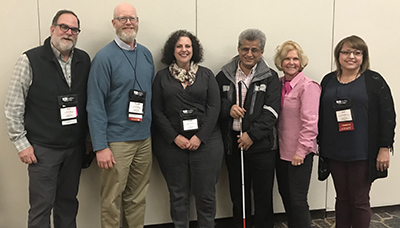
DO-IT and project partners have supported the activities of the Accessing Higher Ground (AHG) conference since its beginning. This event is designed for college and university faculty and staff to ensure that information technology procured, developed, and used at their institutions is accessible to all. At the 2018 conference, Terrill Thompson, Sheryl Burgstahler, Gaby de Jongh, Dan Comden, and Richard Ladner spoke and provided behind-the-scenes support at the conference through the following activities:
- Terrill and Sheryl engaged with colleagues from other institutions in a two-day workshop about how campuses can take steps towards increased IT accessibility.
- Terrill, with assistance from Gaby, offered a workshop on accessible video design.
- Sheryl led a capacity-building institute focused on how computing faculty can incorporate accessibility content in their courses, and Terrill and Richard, who leads our AccessComputing project, presented.
- Sheryl presented on the design of campus IT accessibility services when the availability of resources is low, as well as on how a universal design framework might be embraced campus-wide.
- Terrill taught participants how to audio describe videos.
- Richard reported the results of a survey that sought to determine what percentage of computing faculty already teach about accessibility and shared options for doing so.
- Dan assisted with presentations and provided technical support and photography throughout the conference.
AccessComputing—which is led by DO-IT and the Paul G. Allen School of Computer Science & Engineering and Information Schools at the University of Washington—honored the AHG founder and current director, Howard Kramer, with the AccessComputing Capacity Building Award.
Howard was awarded for his efforts in drawing together leaders and newcomers in accessibility by hosting the international AHG conference in Colorado for 21 years.
IDEAS Meet and Greet
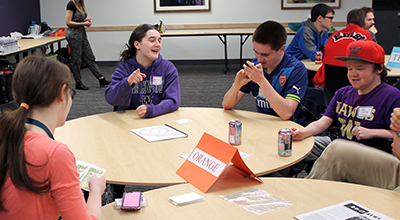
In November, 10 University of Washington (UW) students gathered for a networking meet-and-greet on the UW Seattle campus. This was the first in-person meeting for the Individuals with Disabilities Engaging for Academic Success (IDEAS) project. Students from across all three UW campuses attended the event to meet and discuss topics such as communicating with faculty about academic accommodations, creating communities for people with disabilities on their campuses, and finding jobs and internships.
IDEAS provides a space for students with disabilities at UW to connect with each other and foster relationships based on similar experiences. This project is being coordinated by the DO-IT Center.
The 2018-19 school year will bring many engaging events:
- elevator pitch workshop
- career fair preparation and invitation to the Diversity Career Fair
- disability in the workplace disclosure webinar
- disability identity book club and webinar
- D Center coffee hours and film screenings
- resume workshops
Funding for this project was provided through the Diversity and Inclusion Seed Grants program through the Office of Minority Affairs & Diversity at UW. These small grants support projects for institutional transformation across the UW’s tri-campus community that align with the goals of the 2017-2021 UW Diversity Blueprint.
For more information about the IDEAS project, see the IDEAS announcement in the previous issue of DO-IT News or contact Kayla Brown at kayladb@uw.edu.
New Funding: ADEPT
DO-IT has recently received a grant from the United Engineering Foundation (UEF) for a project called ADEPT: Accessible Design of Engineered Products and Technology. ADEPT will aim to build a strong and sustainable national network of engineering faculty, students, and professionals interested in and able to address issues related to disability, accessibility, and universal design (UD). This project will further the ability of engineers to develop and deploy technology that is accessible to people with disabilities. UD seeks to ensure that products are usable to the widest audience possible, including individuals with disabilities. ADEPT will educate engineers about accessibility, UD, and best practices to involve individuals with disabilities in the design and development of new products and technology through development of a community of practice, training webinars, and accessibility briefs, as well as dissemination of the resources developed.
UEF, founded in 1904 with funding from Andrew Carnegie, aims to advance the engineering arts and sciences for the welfare of humanity. The members of the UEF are the American Institute of Chemical Engineers (AIChE), American Institute of Mining, Metallurgical and Petroleum Engineers (AIME), American Society of Civil Engineers (ASCE), American Society of Mechanical Engineers, and Institute of Electrical and Electronics Engineers (IEEE).
Accessibility Pledge for K-12 Computer Science Education
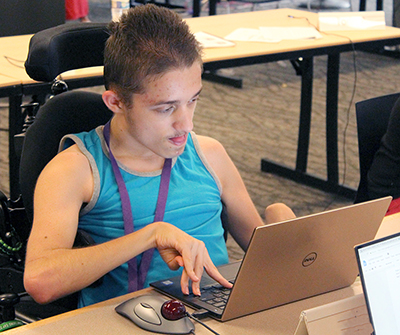
The CSforAll Consortium, an organization committed to bringing computer science (CS) education to all K-12 students, highlights accessibility in K-12 CS education. AccessCSforAll partnered with the Consortium on the CSforAll Accessibility Pledge, which will rally the national community of CS education content creators, program providers, educational institutions, researchers, and investors to take immediate steps to achieve accessibility for existing efforts and ensure that future efforts address accessibility within the design phase. Over one hundred organizations have signed the pledge so far.
To learn more and read the pledge, visit the CSforAll website.
In October, the pledge and related accessibility efforts were highlighted as part of the CSforALL Summit. AccessCSforAll PIs Richard Ladner and Andreas Stefik, and several of our collaborators were featured. Find recordings online of the following
- Call to Action: CSforALL Accessibility Pledge
- Special Guest: Daryl ‘Chill’ Mitchell, Actor and Accessibility Advocate
- Panel: Accessible CS in Practice
AccessCSforAll is a collaboration between teams at the University of Washington and the University of Nevada, Las Vegas in partnership with many of the current and future National Science Foundation computing education grantees, K-12 computing educators, and developers of accessible tools and curricula.
New Video: Teaching Accessibility: Including Accessibility in Your Courses
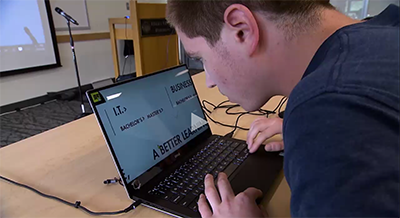
Check out our new video Teaching Accessibility: Including Accessibility in Your Courses. This video features multiple strategies that can be used to teach about accessibility in computing courses. Exposing students to this information can help them create more accessible products throughout their careers. Through interviews with computing faculty, learn more about strategies to teach about disability and accessibility in your computing courses.
Check out some of our other videos as well!:
iPhone X Upgrades and iOS 12 Accessibility Updates
Apple released the iPhone XS and XS Max back in September 2018 as an upgrade to its latest line of smartphone. At the same time, Apple also released a major update to its mobile operating system, iOS 12. In October 2018, the iPhone XR was released as a more cost-effective option over the sleek XS series.
The iPhone XS retail price starts at $999 for 64GB of memory and has a similar form factor to its predecessor. The XS Max boasts a 6.5-inch display with no bezel and starts at $1,099 for 64GB of memory. With Apple’s latest smart phone release, the iPhone XR, consumers can take advantage of the newest technology at a more practical price point, starting at $749 for 64GB of memory.
Hardware and Formfactor
As mentioned earlier, the iPhone XS is comparable to the iPhone X, which was reviewed in an earlier DO-IT newsletter, the only noticeable difference over time will be the upgraded processor. Right now, the A12 Bionic Processor included in the XS series helps launch apps faster but drags battery life down a bit. The XS and XS Max have a stainless-steel metal frame that makes them sturdy, heavy, and a bit awkward when holding the larger phone in one hand. Operability may be limited when using the XS Max for individuals with mobility or hand strength issues due to the larger screen size and weight.
Consumers may be drawn to the XR as an upgrade to their outdated smartphone. The XR is less expensive than the XS series, has a slightly larger screen than the XS, and has much better battery life overall. The only disadvantage of the XR compared to the XS series is the rear camera, which has a single lens with no telephoto option.
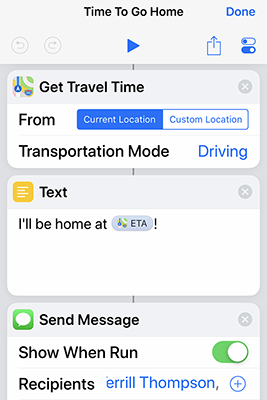
Operating System Updates
The real accomplishment Apple achieved this past fall was the release of iOS 12, an under the hood revamp of iOS 11. This included a new feature that may help with accessibility.
Siri Shortcuts allows users to assign verbal phrases to common tasks performed regularly on your iPhone. It is a consolidation designed to reduce the cognitive load of remembering a series of gestures to complete a task or a series of tasks. For example, announcing to Siri “Time to go home,” can simultaneously send an iMessage to a caregiver notifying them of your ETA, bring up an accessible transit route home using Apple Maps, and send an alert to a third-party key fob reminder—broadcasting its location.
Siri is getting smarter through AI, using Siri Shortcuts will allow this service to learn more about your behaviors and make your smartphone easier to use. Using the Shortcut App that came along with the upgrade of iOS 12 (don’t worry, if you deleted it like I did, you can always go to the App Store and download it for free) is a good place to start. Users can browse through the gallery for pre-configured shortcuts and input the information to begin.
DO-IT Launches ERC-INCLUDES Project!
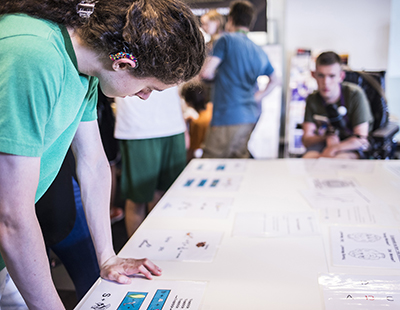
Recently, in close partnership with the UW Center for Neurotechnology (CNT), the National Science Foundation (NSF) provided funding for a project called ERC-INCLUDES. While “ERC” refers to NSF-funded “Engineering Research Centers” such as the CNT, the “INCLUDES” acronym stands for “Inclusion across the Nation of Communities of Learners of Underrepresented Discoverers in Engineering and Science” which is NSF’s largest diversity and broadening participation initiative.
The goal of ERC-INCLUDES is to help realize NSF’s goal of creating “opportunities among currently-funded NSF projects to build a collaborative infrastructure for broadening participation in NSF-funded research activities.” The proposed project will foster collaborations between the ERCs and a variety of INCLUDES initiatives.
The proposed project will engage NSF-funded stakeholders nationwide. It will host a national capacity-building institute; develop a website, an online knowledge base, and other products; and build a durable infrastructure for future work.
Members of the DO-IT community might be more familiar with CNT’s previous name, the Center for Sensorimotor Neural Engineering (CSNE), where DO-IT has hosted workshops and classes, placed students into research internships, and worked on diversity initiatives. The CNT, which is based at the University of Washington but includes researchers from the Massachusetts Institute of Technology, San Diego State University, Caltech, and other partners, changed its name to highlight the key role that neurotechnologies play in its mission.
Since 2011, the CNT has received $27 million from the NSF and has made significant research advances in the field of engineering neuroplasticity, developed educational tools about neurotechnology and brain-computer interfaces, and become a leader in the field of neuroethics.
Federal Employment Opportunities Including Schedule A and the Workforce Recruitment Program
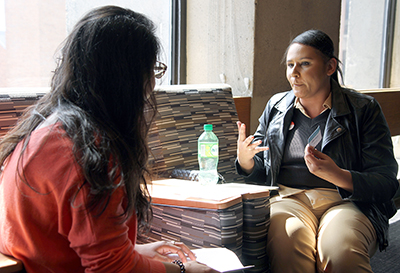
Schedule A is a hiring authority that enables federal agencies to speed up the process of hiring qualified persons with disabilities. If you are eligible for Schedule A and interested in federal employment, it is to your advantage to search for positions posted as “open to individuals with a disability” on the USA Jobs website. To find out more about eligibility for Schedule A, tips for applying under Schedule A and how to search the website for jobs, visit the Individuals with Disabilities page on the USA Jobs website.
The Workforce Recruitment Program (WRP) is a recruitment and referral program that connects federal and private sector employers nationwide with highly motivated college students and recent graduates with disabilities. In fall 2018, 28 applicants representing the three University of Washington campuses personally interviewed with trained WRP federal agency recruiters in hopes of connecting with summer or long-term opportunities. Participants have a wide range of career interests and backgrounds.
During the interview process, students received assistance developing their resume, preparing for the interview questions, and practicing via mock interviews. Participants who completed WRP interviews are included in a national database that captures their resume, transcripts, highlighted skills, locations where they would like to work, their schedule A status, and a summary of their recruiter interview. The student information in this database is made available to employers for one year. During that time, employers reach out to participants and invite them to apply for open positions. Since it’s beginning in 1995, over 7,000 participants have received temporary and permanent employment through WRP.
For more information on WRP, consult their website. WRP is managed by the U.S. Department of Labor’s Office of Disability Employment Policy and the U.S. Department of Defense’s Office of Diversity Management and Equal Opportunity.”
DO-IT Mentor Receives National Award
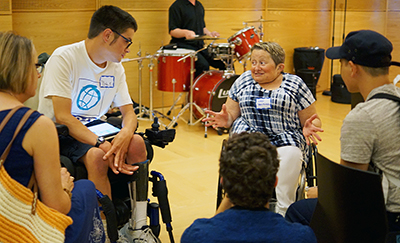
DO-IT Mentor Karen Braitmayer was awarded the 2019 Whitney M. Young, Jr. Award from the American Institute of Architects (AIA). The Whitney M. Young, Jr. Award, named after a civil right activist, is awarded to an architect or firm that “embodies social responsibility and actively addresses a relevant issue, such as affordable housing, inclusiveness, or universal access.”
Karen’s passion for accessible and universal design led to the creation of her firm, Studio Pacifica. Karen’s work goes beyond compliance with codes, as she strives to make spaces as accessible as possible, a quality that led to her appointment on the U.S. Access Board by President Obama in 2010. Learn more about Studio Pacifica on their website.
The award will be presented in February in Las Vegas. Congratulations, Karen!
To learn more about the award, and read excerpts from her nomination letters, visit the AIA website.
Advice from AccessComputing Team Members
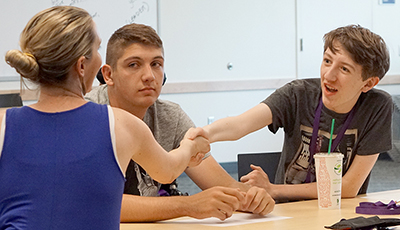
Every summer we ask AccessComputing Team Members to share what they have been up to this summer. Many of our students participated in internships, academic conferences, and other activities that our community would benefit from learning about. Below is some advice for other students:
“Take advantage of opportunities. It is good to go on internships, so you can figure out what you like and don’t like. If you are on an internship, and you are not enjoying it, or you are finding it to be boring, do something outside of work that you enjoy and develop yourself professionally.” - Abraham
“Seek out the opportunity to conduct your own research. Thinking up a research question and being able to follow through with a plan to answer it is extremely rewarding and was a great learning experience for me personally.” - Bec
“It’s think it’s worth looking in places you might not expect for job opportunities.” - Annelise
“If you are interested in a subject or a job, take advantage of any chance to connect with relevant professors, researchers, or potential employers. Speak up, say hello, voice your ideas—this networking may pay off in the future.” - Caitlyn
“Take the opportunity to go to conferences and feel what it is like to attend and network with others. I got really good resources from the conference and a lot of swag!” - Lidia
For more information about students with disabilities who are pursuing careers in computing, check out our Choose Computing Profiles on the AccessComputing website.
2018 Champions for Computer Science Awards
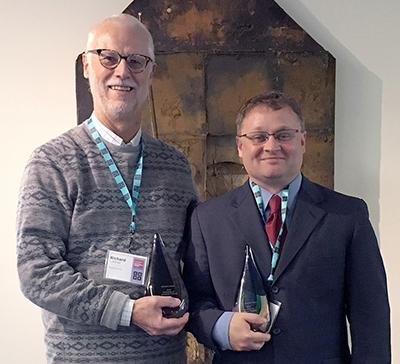
In December, AccessCSforAll PI Richard Ladner and the Quorum programming language, led by AccessCSforAll PI Andreas Stefik, both received Champions of Computer Science (csedweek.org/awards) awards from the Computer Science Teachers’ Association and Code.org. The awards were presented by Melinda Gates on December 3 as part of a Computer Science Education Week (CSEd Week) kickoff program held at the University of Washington. Melinda Gates described the award as a “lifetime achievement award” with a different name, so as not to imply it is the end of their work. During CSEd Week, the NSF also promoted AccessCSforAll’s work in an article about accessible tools and curricula.
As noted on the CSEd Week website, “While many organizations and programs have sought to make computer science available to all students, often it was through pathways and tools that were fundamentally inaccessible for students with disabilities.” Ladner and Stefik’s work aims to change this.
About DO-IT
DO-IT (Disabilities, Opportunities, Internetworking, and Technology) serves to increase the successful participation of individuals with disabilities in challenging academic programs and careers, such as those in science, engineering, mathematics, and technology. Primary funding for DO-IT is provided by the National Science Foundation, the State of Washington, and the U.S. Department of Education.
For further information, to be placed on the DO-IT mailing list, request this newsletter or other materials in an alternate format, or make comments or suggestions about DO-IT publications or web pages, contact us at
DO-IT
University of Washington
Box 354842
Seattle, WA 98195-4842
doit@uw.edu
www.uw.edu/doit/
206-685-DOIT (3648) (voice/TTY)
888-972-DOIT (3648) (toll free voice/TTY)
509-328-9331 (voice/TTY) Spokane
206-221-4171 (fax)
Founder and Director: Sheryl Burgstahler, Ph.D.
Program Manager: Scott Bellman